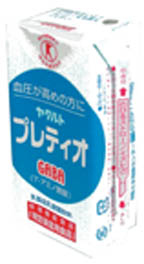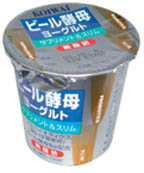
In its updated look at the yogurt market in the U.S., Mintel (Chicago) finds total U.S. sales of yogurt at food/drug stores and mass merchandisers (FDM), excluding Wal-Mart (Springdale, Ark.), hit nearly $2.4 billion in 2004. Certainly a sizable category, the total is nevertheless an increase of only 2% from 2003, which equates to a 0.6% decline in current prices.
Why did the category fare so poorly? The largest segment recorded flat growth in a year-versus-year basis but, making matters worse, regular/other yogurt products actually saw sales decline 5.0% between 2002 and 2004, according to Mintel's analysis of Information Resources Inc. (IRI, Chicago) data. With this segment accounting for 51.1% of the yogurt category, such a fall hindered even notable growth in the other sectors.
Mintel also attributes the minimal market growth to “the lack of growth in the niche segments (desserts and kids' yogurts)” but, considering these comprise only 15.5% of the market, it is difficult to imagine even a phenomenal performance impacting the category as a whole. As it is, those segments appeared to perform reasonably well between 2002 and 2004. Admittedly, sales of kids' yogurts dropped 0.3% to $321 million, due in no small part to declines in sales of Dannon's (Allentown, Pa.) Danimals and Sprinklins, as well as Yoplait's (General Mills, Minneapolis) Yumsters. In fact, Mintel reports Stonyfield Farm's (Londonderry, N.H.) YoBaby was the only child-positioned yogurt to record a “notable” increase in sales in 2004, finishing the year with $29 million in sales, according to Mintel/IRI data.
Considering the results of a Simmons (New York) NCS Fall 2004 survey of children, the relatively poor performance of the products should be little surprise. Simmons finds low penetration of yogurt among young people. Less than 50% of children between six and 11 indicate they eat yogurt, suggesting an area with potential for yogurt manufacturers.
Since 1998, the bright spot has been in products geared to more grown-up consumers.
Just Desserts
Dessert yogurt sales increased by 277% between 1998 and 2003, to reach $456 million. However, Mintel's updated statistics indicate the segment has begun to falter. Sales of dessert yogurts fell by 7.8% at current prices between 2003 and 2004 (a drop of 8.8% at constant 2004 prices), largely due to a 36.7% decline in the sales of Kraft's (Northfield, Ill.) Breyers Crème Savers brand between 2003 and 2004.The saving grace for the category has been the light/no-fat segment, which grew 26.6% between 2002 and 2004, to reach $585 million. Sales there have grown 129% at constant prices since 1999, 102% at constant prices, much of it thanks to increased sales of Yoplait light yogurt and the introduction of new low-carb products. While waning consumer interest in low-carb dieting may portend a decrease in those introductions, new dietary guidelines could signal a bright future for the segment: The new U.S. dietary guidelines issued in 2005 promote the consumption of three cups of low- or non-fat dairy products a day, often easily supplied by yogurt.
Also buffeting the category to a small degree has been the success of yogurt drink products, adding a convenient aspect to the healthful perception of yogurts. According to ACNielsen (New York), yogurt drinks are among the fastest-growing food and beverage segments. Leading the growth has been the 74% year-on-year (2003 to 2004) growth by Dannon Light 'n Fit smoothies, and that company's Frusion yogurt drink also fared well--rising by 102% to hit $42 million in sales in 2004. Mintel's separate “Yogurt Drinks--U.S.” report predicts the segment could grow from $213 million in 2003 to $494 million in 2008, a 107% increase in constant terms and real economic growth of 15.6% annually.

Getting Health
While Mintel does not analyze the yogurt drink segment in this report, one caveat can be drawn from the growing popularity of yogurt beverages: their increasing sales likely will have a minimizing effect on future growth of traditional yogurt products, due to some cannibalization of sales. As such, Mintel predicts more yogurt introductions will offer value-added health benefits, similar to Yoplait's Healthy Heart. These products contain plant sterols to promote heart health, claiming to help lower cholesterol and add vitamins A and D.Similar to the overall performance of the category, the top two yogurt companies reported little sales growth between 2002 and 2004. Yoplait and Dannon, together, account for roughly 61% of the market. The former's $867 million in 2004 sales was 35.2% of the market, while the latter's $629 million that year commanded 25.6%. Further back in the pack, a little more movement was seen during the period under review, as Stonyfield Farm increased its market share by 1.5% to surge ahead of Kraft.
Kraft's declines in the yogurt segment prompted the company to rethink its approach to the category. Sales dropped 15.4% from 2002 to 2004 and, in December 2004, Kraft announced plans to sell its Breyers yogurt business to CoolBrands International Inc. (Ronkonkoma, N.Y.) for approximately $59 million, a transaction also including Kraft's North Lawrence, N.Y., manufacturing facility. The deal sees CoolBrands obtain the licenses to Kraft's Breyers, Crème Savers and Light n' Lively brands, all part of Kraft's “decision to focus on businesses that it believes can sustain a competitive advantage,” notes Mintel.
Consciousness
As Kraft faltered, however, Stonyfield Farm was promoting health and environmental friendliness. In league with Recycline (Somerville, Mass.), the pair created a system where Recycline uses recycled Stonyfield yogurt cups to make handles for its products. On the healthful front, the company also expanded its line of YoBaby products with YoBaby Plus Fruit & Cereal, claimed to be the first yogurt fortified with iron, in response to data indicating anemia affects one out of every 10 American babies. Containing an organic apple puree, the products also boast organic cereal grains like oats, flax, rice and bran on the bottom.In addition, the success of Stonyfield's first healthy vending machine in Rhode Island prompted the company to expand the effort into Chicago and Connecticut public schools. The machines offer a variety of all-natural and organic products, including Stonyfield Farm organic smoothies.
While school vending may be a wave of the future for yogurt sales, present-day sales are almost entirely through supermarkets. In fact, IRI data indicate 99% of total yogurt sales in 2004 were via the supermarket channel. Sales at mass merchandisers (excluding Wal-Mart) improved by 66% between 2002 and 2004 but, according to Mintel, these channels represent only 1% of the total market. Still, the success and sheer growth of the supercenter concept makes it likely that yogurt sales via this channel will increase.
Over the next five years, the yogurt category will see sales increases, according to Mintel forecasts, of 36% at current prices and 16% at constant prices, but the improvement will not come from the category's largest segment. Sales of regular/other yogurt are expected to decrease by 10% at current prices (23% at constant prices) between 2004 and 2009, an even steeper dive than the 6% decrease (a 17% fall at constant prices) from 1999 to 2004.
No, the promise in the category is forecast to occur in the other three segments, particularly in the healthful positioning of light/low-fat yogurt products. U.S. sales of these are expected to increase by 70% (45% at constant prices) through 2009. Admittedly, that is not the same pace as the 129% growth (102% at constant 2004 prices) between 1999 and 2004, but the segment will set the pace for the rest of the category.
Likewise, kids' and dessert yogurts are forecast to increase their sales levels. Sales of dessert yogurt in the U.S. should increase at an inflation-adjusted annual rate of 11.5% through 2009. The growth equates to a 102% increase (72% at constant prices) which, while impressive, is well below the 213% (176%) growth seen between 1999 and 2004.
The forecast for kids' yogurts is positive but not as notable, with Mintel expecting a 5.6% rate of inflation-adjusted annual growth. Similarly, the growth will not be as impressive as that enjoyed between 1999 and 2004.
For more information on a topic covered by a Mintel report, go to www.PreparedFoods.com and click “Mintel Research Reports” on the left navigation bar. To reach any of these reports, click “eating habits, food trends.”
Going Global: Functional Foods Keiretsu
Giant mergers among North American-based companies are big news. Thousands of people are affected, and such business changes influence marketing, distribution and new product development initiatives. Similarly in Japan, the formation of a keiretsu is of enormous importance. Keiretsus are conglomerates often unified more by tradition and custom than by formal legal ties. Commonly, a cross-holding of shares ("interlocking shares") takes place with group-affiliated firms issuing shares to member firms.Prepared Foods' June 20, 2005, e-newsletter reports that three Japanese companies, Kirin Brewery Company Ltd., Yakult Honsha Co. Ltd. and Kirin Beverage Corporation, formed a business alliance centering on health foods and functional foods. Kirin Beverage acquired 1.40% of Yakult Honsha's outstanding shares for some $46 million; Yakult Honsha acquired 0.44% of Kirin Brewery's outstanding shares for about $41 million and 0.36% of Kirin Beverage's outstanding shares for some $4.6 million. Key aspects of the alliance include shared manufacturing, distribution and certain promotional operations in the growth areas of health and functional foods. The group will make use of R&D capabilities gained through their beverage, food and pharmaceutical businesses.
Interesting new product launches already have appeared. For example, Mintel's GNPD reports that Yakult Honsha introduced a lactic acid bacteria drink that is said to lower high blood pressure under the Pletio brand in the spring of 2005. It contains 10mg of GABA (gamma amino butyrate) per 100ml as well as L. casei Sirota and Lactococcus lactis. In 2003, Kirin Brewery's Koiwai Dairy Products launched a yogurt said to have “Bb-12 bacteria and 5g of beer enzymes.” It will be intriguing to see what products a yogurt keiretsu will produce.
--Claudia D. O'Donnell, Chief Editor
